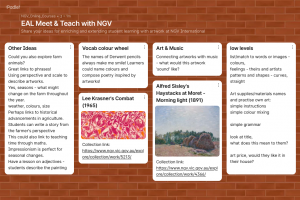As the EAL Unit and VicTESOL say farewell and thank you to Christine Finch, Blackburn English Language School Principal Mark Melican took the opportunity to lead her through a series of reflective questions.
What are your earliest memories of schooling?
I didn’t attend kindergarten, but have many very strong and happy memories of my primary schooling at Horsham North Primary School, including reciting the Oath of Allegiance to the Queen at Monday morning assembly. My earliest memory is of my mortification for getting in trouble, probably just being spoken to, for pushing in line with Shireen in Prep. I remember my amazement when Miss Smith explained to me in Grade 1 that ‘this morning’ was in fact two words, not ‘dismorning’, Singing and Listening ABC music lessons being broadcast over the classroom loudspeaker, quiet reading time, Cuisenaire rods, free government-provided milk (1/3 pint daily, left in the sun until we drank it), oral Sabin and many injections, and learning both the imperial and metric measurement systems.
At what age did you decide you wanted to be a teacher and what prompted that thought/decision?
Teaching was always in the background as an option. My mother was a teacher and I was one of those kids who love school. I decided to do a Diploma in Education after my Bachelor of Arts (for a number of complex and not terribly interesting reasons) and because of my interest in languages and linguistics, and working with EAL learners (see below) it was a no-brainer to select EAL as a method.
Where was your first teaching appointment and how do you remember the experience?
My first teaching appointment in 1984 was at Hopetoun High School, in the Mallee, as an English teacher. It was an excellent place to start a career and hone my teaching skills. It’s a small community, and the school was a strong part of that. As well as teaching English, I worked with students on all sorts of extra-curricular activities such as the school magazine and drama performances, coached sport, learnt to drive a wheat truck so I could drive school buses on camps. Cultural diversity was not an obvious element of the town and I recall someone saying ‘Are you a migrant?’ with some amazement when I told them I was a Migrant English teacher (as EAL was then known).
When and where in your career did EAL teaching come to prominence and what was the stimulus that led you to this field?
At university, a friend got me involved with a volunteer group. We went to the homes of recently arrived adults and children to support them with language learning. The students I remember most vividly were two Vietnamese refugee orphans, boys in Year 11, who had lost their parents and travelled to Australia in circumstances that I found staggering. Here they were, a year or two younger than me, and they had survived all that and were positive and forward-looking and trying to make the best of their new lives. And I could help them, because of the relatively privileged life and education I had had. I learnt as much from them as they did from me, obviously in a very different way, and really enjoyed the challenge and the reward of working with them.
After Hopetoun High School, I was appointed, in 1987, to Footscray High School which ran a very large and strong EAL program, and it was there that I had the opportunity to teach students at all secondary levels and stages of English language learning, from both migrant and refugee backgrounds. Our students at that time came largely from Vietnam and what are now the former Yugoslav republics. Over the ten years I worked there, the student cohort changed and included students with no first language literacy as well as those with intact education, so I had the opportunity to broaden and deepen my understanding of student needs and pedagogies to support them.
I heard you say that you joined LMERC in 1999 and how much you loved the work there. What was it about that role that you remember so fondly?
I belonged to LMERC as a teacher and always found great resources, inspiration, enormous expertise and like-minded people to talk to there. When I worked there, we had a shared understanding of the needs of EAL learners and multicultural communities, and a common purpose in working to provide their teachers with resources, advice and professional learning to support them. I loved working with teachers and MEAs across the state, gaining a deeper knowledge of our schools and students and programs, planning and delivering professional learning, developing resources – as well as the unplanned day-to-day questions you would be asked or issues you would need to think about. And all of this focused around EAL and cultural diversity, and used and built on my teaching experience.
At this transition point in your career you have probably reflected on your work and the people you have worked with leading the EAL Unit in the DET. How would you sum up that experience?
It’s very difficult to sum up in a few words. It’s been a privilege to work within the central office of the Department and to lead the work of the EAL Unit. In that role, you learn of the breadth and depth of work done by so many principals, teachers, MEAs and other staff to support EAL learners in Victoria. You get to work with the non-government sector: the professional associations, the tertiary institutions and their staff, settlement support and welfare agencies. And in your core role, you work within and across the Department, ensuring that appropriate supports, funding, resources, data and policies are available for and take into account the needs of EAL learners. Starting out as a classroom teacher, I did not feel any connection to ‘the Department’, and certainly did not realise what was going on behind the scenes to support me being in a classroom, as a specialist teacher, to support those EAL learners.
So much has changed in the field since I began teaching. From Migrant English to ESL to EAL to…emergent bilinguals? From Learning English in Australia to the course advice to the CSF (I and II) to VELS and the ESL companion to the Victorian Curriculum F-10 EAL. From the discourse about non-English speaking background to a curriculum that acknowledges, includes and leverages existing skills and knowledge through the plurilingual strand. From scattered English language centres to a growing new arrivals eco-system with multi-campus schools and a virtual program delivering to students across the state. We’ve come out of the broom closet, as I like to say!
What hasn’t changed is the need of students to learn English and the energy and dedication of the professionals in the EAL field to ensure that they have the best possible chance of success in education and in life. I’ve been incredibly lucky to work with such people in schools and in the government, non-government and not-for-profit sectors for more than 38 years, and to see the positive changes for EAL that have taken place during that time.



